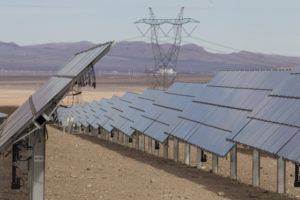
The Silver State Solar Energy Center in Primm, Nevada
Credit: Erik Verdusoo/LV Review-Journal
CARSON CITY — Nevada’s burgeoning rooftop solar industry crashed and burned last year after new rates for net metering eliminated financial incentives for the green energy investment.
Now several state lawmakers want to get the industry back on track and growing again.
Nevada lost more than 2,500 rooftop solar installation jobs in 2016 after the less generous net metering rates were approved by the state Public Utilities Commission. Net metering provides homeowners with a credit for the excess electricity their systems generate.
Both the Assembly and the Senate have created special subcommittees on energy to focus on ways to make rooftop solar financially attractive for homeowners and put Nevada back on track with the industry and the thousands of jobs it can create in a state with nearly limitless sunshine.
Specific proposals on net metering are not likely to emerge […]











As someone who has lost my job in solar several times over the last decade, I can say that the volatility of the solar market is in part due to it being an artifical market. Federal, state PUC’s and local policies, regs & incentives create and destroy solar markets. I’ve been on both ends. Rooftop solar for residential still does not make sense, sadly. I support it for reasons of decentralization but we still need storage technology to drive the cost lower & energy density higher. Commercial scale is nearing a sweet spot according to data. Utility scale is dirt cheap and I think will continue to grow regardless of policy but again it is a manipulated market so have to see what plays out.
Stephan–at last, something you and i agree on! My old home state of Nevada has shot itself in the foot numerous times recently (including a recently-enacted, essentially unenforceable gun control measure–but I digress). My family members who still live there were all shaking their heads about the stupid solar policies the previous legislature passed. I hope this new initiative works!
@Mark R. interesting insights. Always good to hear from someone whose knowledge isn’t just theoretical. Wouldn’t you say it’s the case though that government/PUC policies and regs affect the markets for conventional power generation just as artificially, albeit in different ways, as they do the solar market–the difference being that conventional power has the advantage of being the alread-installed 800-lb gorilla?
That’s good to know, and someone told me you were not a Trump supporter, so that’s two things. 🙂